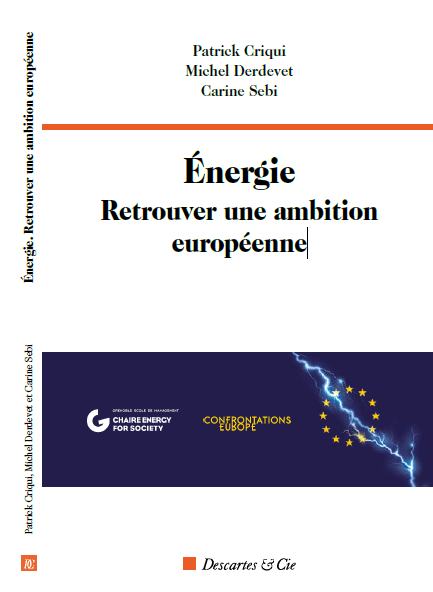Energy: Rediscovering European ambition – A call to action

 Published by Descartes & cie, Energy: Rediscovering European Ambition begins with a dystopian narrative that highlights the dangers of disunity in energy policies within the European Union. The authors, experts in energy and European issues, warn of the consequences of fragmented policies among Member States. Their reflections underscore the urgency of economic, energy, and environmental transitions, which are crucial for Europe’s future. They emphasize that these transitions must serve citizens to preserve the unity and future of European integration.
Published by Descartes & cie, Energy: Rediscovering European Ambition begins with a dystopian narrative that highlights the dangers of disunity in energy policies within the European Union. The authors, experts in energy and European issues, warn of the consequences of fragmented policies among Member States. Their reflections underscore the urgency of economic, energy, and environmental transitions, which are crucial for Europe’s future. They emphasize that these transitions must serve citizens to preserve the unity and future of European integration.
This work is a call to action for all societal actors. The authors’ proposals open an essential debate on the need to unite efforts to ensure Europe’s energy sovereignty, protect its social model, and defend the environment. This book is a must-read for anyone interested in current energy challenges.
Find this book in all good bookstores or online via Independent Bookstores
A weakened energy market – diversity as a strength
In the chapter Europe’s Energy: Between Ideal and Reality, the Cost of Disunity, the authors analyze the negative impacts of a disjointed approach. Geopolitical tensions and competition between Member States can weaken Europe’s energy sovereignty, leading to shortages and price increases. Strengthened cooperation is therefore essential to ensure stable and equitable supply.
The chapter An Energy Diversity Inherited from Geography and History discusses the wealth of resources unique to each Member State. The authors stress the importance of valuing this diversity to build a collective energy strategy. By leveraging each nation’s specific strengths, Europe can bolster its resilience in the face of crises.
Towards necessary cooperation
In the chapter Ending the War of Transitions, the authors highlight the need for increased collaboration between States. They propose a common regulatory framework, essential to encourage investments in renewable energy. By uniting efforts, Europe will be better equipped to address contemporary challenges and ensure a fair transition.
The chapter Investing in Emissions Reduction and Green Industries emphasizes the need to invest in clean technologies and energy efficiency. These measures are crucial for meeting the European Union’s climate goals while fostering economic growth.
The interconnection between energy and climate
In the final chapter, Energy-Climate: From the Planet to International Challenges, the authors explore the links between energy and climate policies. They advocate for European leadership on climate, requiring concerted actions across Europe and proactive energy diplomacy.
Carine Sebi is an Associate Professor at Grenoble Ecole de Management and holds the Energy for Society Chair. Her research focuses on evaluating public policies, such as energy efficiency and renewable energy.
The Energy for Society Chair studies the impact of new energy services that reconcile attractiveness, business, and citizen engagement. The Chair’s current research focuses on the social acceptance of new energy infrastructures, such as wind power and biogas production
What energy training for future generations?
With its cutting-edge expertise, Grenoble Ecole de Management trains future managers on climate, energy, and transition issues in the private and public sectors.
 MSc Energy Business & Climate Strategy
MSc Energy Business & Climate Strategy
This program equips students with the skills and competencies firms and public sector organizations need to confront the challenges of sustainable energy and climate change and meet their net-zero ambitions.
 MSc Management for Sustainability Transitions
MSc Management for Sustainability Transitions
This program prepares students for leading transformational change in business, public, and non-profit organizations toward systemic sustainability.
 Advanced Master in Energy Transition Management and Marketing
Advanced Master in Energy Transition Management and Marketing
This work/study program co-accredited with renowned university Grenoble INP – Ense3 aims to train managers (both suppliers and clients) in the energy market industry. the students will develop key skills in such areas as sales and marketing development, strategic analysis, or energy transition project management.

